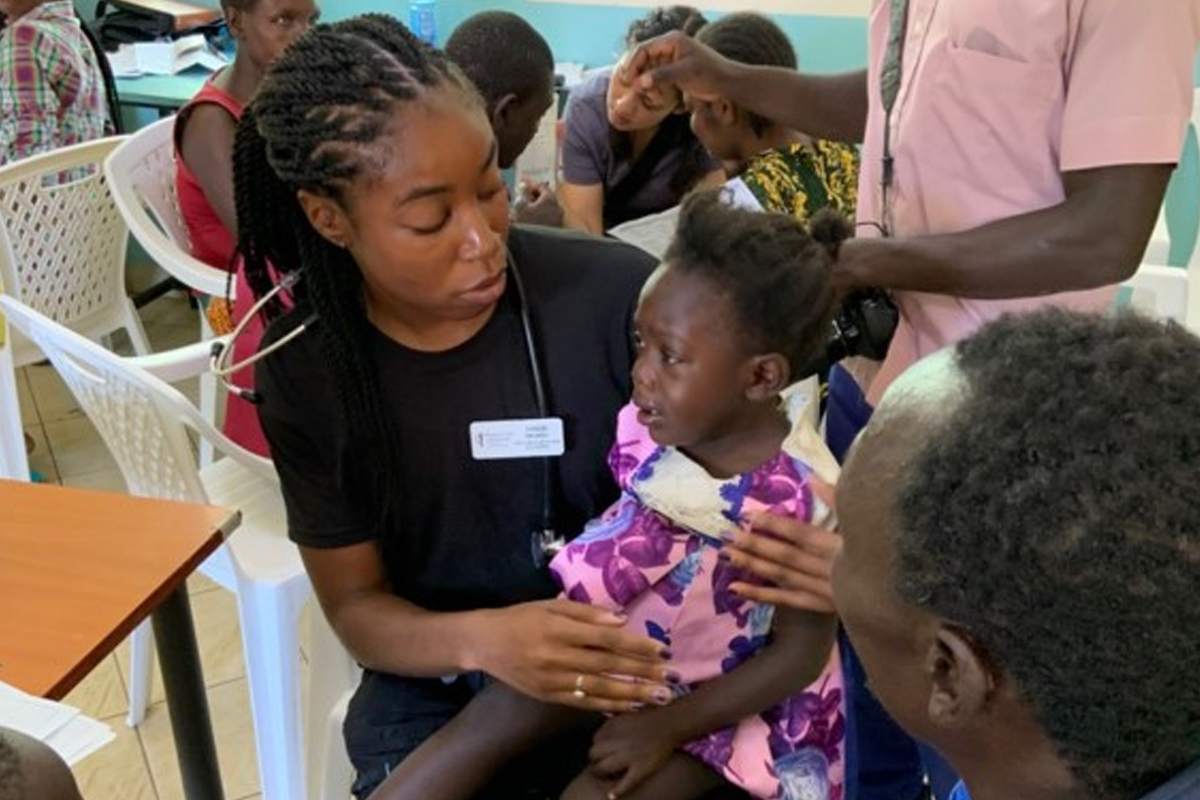On mission in Kenya: Through the eyes of two students

Led by Gautam Desai, DO, FACOFP, dist., KCU professor and chair of Primary Care, a group of third- and fourth-year osteopathic medical students spent two weeks recently in Masara at the Mama Pilista Memorial Health Care Center, named in honor of the mother of Bonyo Bonyo, DO, KCU adjunct professor. Elizabeth Alex, KCU senior director of public relations and community outreach, interviewed fourth-year student doctors Kayla Shorten and Chisom Okuagu about their experiences there.
Q: When your friends and family ask you about your trip, what do you tell them?
Shorten: One of the first things I tell them is what an incredibly humbling experience the trip was. Seeing how people can live with so little yet still be happy continually reminded me how fortunate I am to have access to healthcare, clean water, regular meals, and even time for hobbies.
Okuagu: I tell them about this newfound love for the country of Kenya. I tell them how incredibly beautiful the country is, how vibrant and deeply rooted, the different cultures and communities are. I tell them how welcome I felt while there, and how beautiful the people were.
Q: Why did you invest your time and money to go on the trip—especially given how much you have going on as a medical student?
Shorten: Global health rotations have forever found a place in my heart and I knew that I would feel much more fulfilled in my medical education if I could experience and take part in how healthcare is delivered in a different country and learn from their physicians and nurses.
Okuagu: I think this was a situation where all of the stars were perfectly aligned. First, I had time in my fourth- year schedule. Additionally, I had the ability to request additional loan funding for this trip. All of this was fueled by my desire to serve in a global capacity. Since this mission was in Africa, my own internal desires to serve the underserved and help my people were definitely at play. Once we were able to obtain approval for the trip, it was a no-brainer that I would go!
Q: What did you learn that will make you a better doctor?
Shorten: I learned that sometimes patients just need someone to listen to them and to feel understood in their needs. I also learned that you no matter how much you and your patient want it, you can’t always fix everything.
Okuagu: I learned that humility is crucial in every environment, but especially in environments that are unfamiliar. It is okay to learn from your patients, especially as a student. I interacted with so many patients that were well versed with their ailments, which was especially helpful when considering that the diseases native to the region aren’t diseases I had encountered in the U.S. Moreover, understanding and experiencing firsthand that I will not know everything, and even the supervisors around me may not know everything. But also being okay with that—in those instances we relied on experts, literature and other resources to obtain what we sought and figure out the best way to move forward, which just highlights the nature of medicine in itself.
Q: Is there one experience that sticks out in your memory?
Shorten: My very first patient in Kenya was a 2-year-old boy with malaria who was very sick. He had a high fever, was extremely lethargic, and would not eat or drink. It turned out he was positive for more than one type of malaria and had to stay in the hospital overnight for treatment. The medication to treat malaria worked so well for him that by the next morning he was able to drink and was sitting up, smiling, and asking to go home. If it wasn’t for Dr. Bonyo’s clinic, this little boy may not have had access to the life-saving medicine that treats malaria so easily.
Okuagu: I think about the last day we were at the clinic. You could see at that point that everyone had established relationships with the interpreters and other community members. It was so beautiful seeing the evolution from the first to last day there and how comfortable everyone had grown with each other. Even from the beginning, the global health team was welcomed with open arms and it was amazing to be so welcomed into the community like that.
View photos by clicking here.
